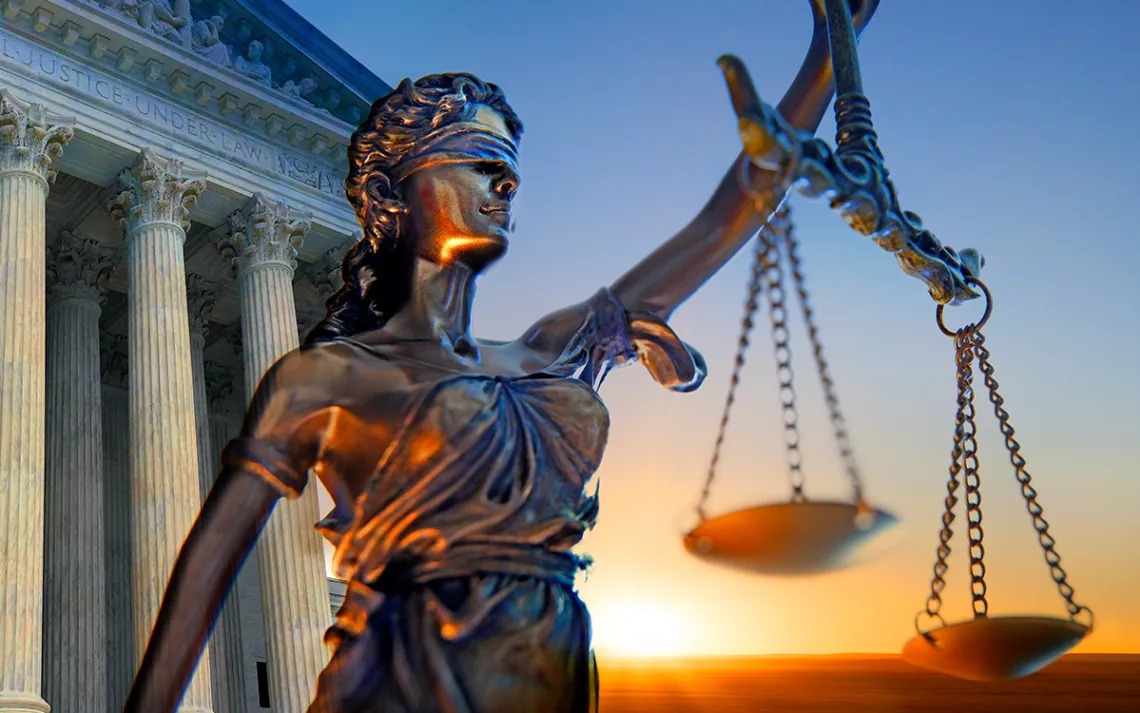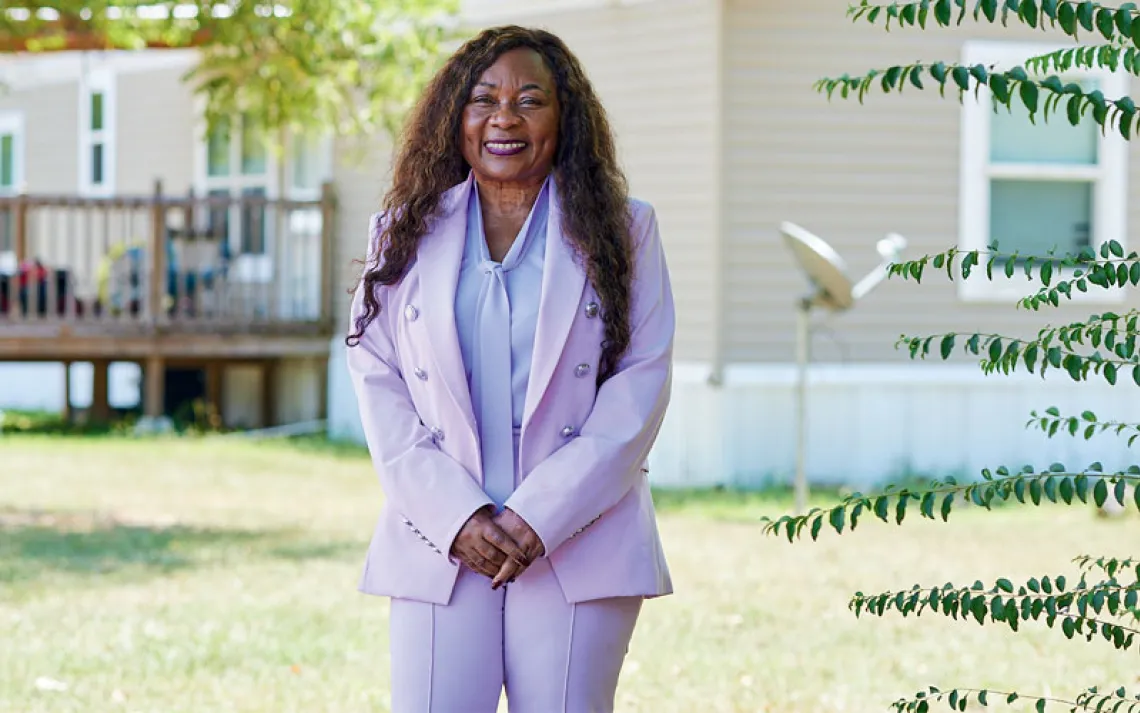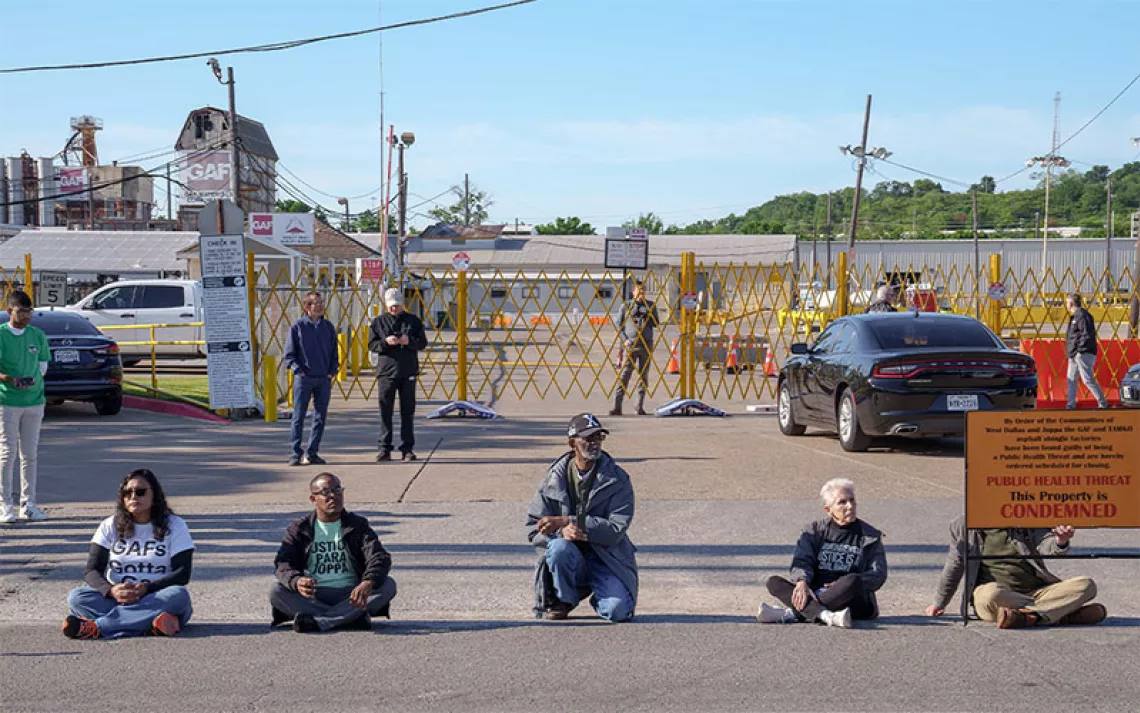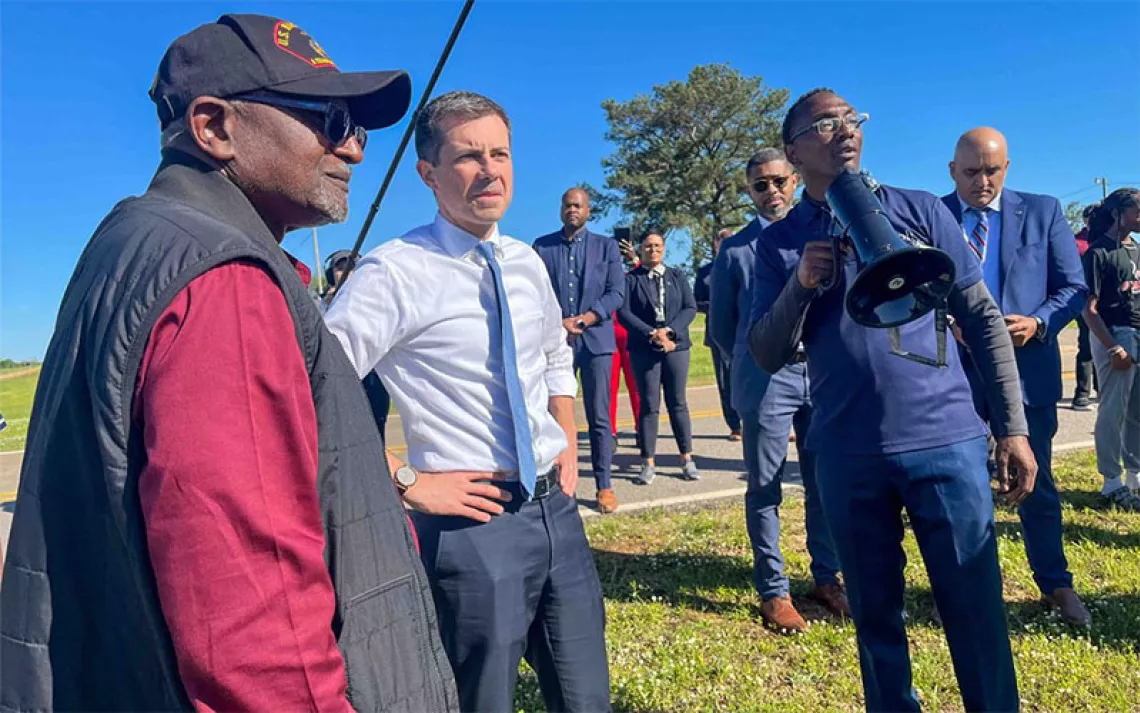Biden Administration Deals a Legal Blow to Big Oil
President passes a major test as Department of Justice backs state and city climate change lawsuits

Photo by iStock/DNY59
The Biden administration failed a major climate test last month when it granted approval of the controversial Willow project in Alaska—and in the process shattered the president’s promise to end new oil and gas drilling on federal lands. Although it received far less attention, the administration in March passed another major climate test and fulfilled one of President Biden’s other climate-related campaign pledges: a promise to “strategically support” climate litigation against carbon polluters.
Since 2017, nearly two dozen cities, counties, and states have filed lawsuits against oil and gas companies in an effort to recover the costs of adapting to climate change damages. None of the cases have yet gone to trial, as the oil giants have waged a procedural campaign to move the cases from state courts to federal courts—which they view as being more sympathetic to their case. Last year, ExxonMobil and oil refining company Suncor asked the US Supreme Court to intervene in the case brought against them by the city and county of Boulder and the county of San Miguel, Colorado. The justices then asked the Department of Justice to provide its opinion on the question of venue before making a ruling.
In a brief submitted to the Supreme Court on March 16, Solicitor General Elizabeth Prelogar urged the court to reject the ExxonMobil and Suncor petition. The Biden administration backed the Colorado communities’ position that the case arises solely under state law and belongs in state rather than federal court. “After the change in Administration … the United States has reexamined its position and has concluded that state-law claims like those pleaded here should not be recharacterized as claims arising under federal common law,” the Department of Justice argued.
Environmental advocates praised the move, which they said is an important step toward holding carbon polluters legally accountable for the damages caused by climate change. “By finally ending its Trump-era support for Big Oil, the Justice Department has added its voice to a series of unanimous court rulings that support communities in their efforts to hold fossil fuel companies accountable for their climate lies,” Richard Wiles, president of the Center for Climate Integrity, said in a statement.
Not surprisingly, the Trump administration previously had intervened in support of the oil and gas defendants and argued that the climate lawsuits should proceed in federal courts. But that argument seems to be a willful misreading of the law. The state and city lawsuits were carefully crafted to target not the climate problem itself, nor the production and use of fossil fuels, but the industry’s false representations—essentially lies—about the climate risks of its products. As a federal appeals court noted in a March 23 ruling affirming that Minnesota’s case against oil and gas companies belongs in state court, Minnesota is among “the growing list of states and municipalities trying to hold fossil fuel producers responsible for alleged misrepresentations about the effects fossil fuels have had on the environment.” With that ruling, the Eighth Circuit Court of Appeals became the sixth federal appeals court to say that this kind of litigation should be handled by state courts.
The lower courts have unanimously and repeatedly rejected the defendants’ attempts to force the cases into federal courts. This means the Supreme Court is likely the industry’s last shot at avoiding state courts, where it could face discovery and trial—and the risk that the details of its alleged deceptive conduct will finally be revealed. Advocates for polluter accountability, including some Democratic senators and Democratic state attorneys general, have spent two years calling on Biden’s Department of Justice to reverse its Trump-era position on the climate liability lawsuits. But the department had remained on the sidelines until the solicitor general filed her brief last month.
Alyssa Johl, an attorney with the Center for Climate Integrity, said the Supreme Court justices will be “looking to see whether the Biden DOJ will take a different position than the Trump administration.” She added that it is clear from a legal standpoint that the industry’s argument is wrong. “The law is on the side of the plaintiffs,” she said. “It’s very clear these cases can and should proceed in state court.”
Karen Sokol, a professor at Loyola University New Orleans College of Law, agreed that the law is clear and that the industry’s interpretation of it is wrong. “The industry has no basis for removing [these cases] to federal court,” she said.
But Sokol said she is concerned that the Supreme Court might consider granting the industry’s petition anyway and was surprised that the court even requested the Justice Department to weigh in. “It seems like a no brainer in terms of denial [of the petition]. So to me, asking the solicitor general is odd,” she said. “I don’t have confidence that the solicitor general’s brief will matter a lot. I think this [Supreme Court] majority does what it wants.”
DOJ could conduct its own probe of Big Oil’s climate lies
Climate accountability advocates are also urging the Department of Justice to go a step further and open its own investigation into Big Oil and climate deception.
“The US has dealt with large corporate interests lying to the American people before, and we need to take lessons from that important work,” said Delta Merner, lead scientist at the Union of Concerned Scientists’ Science Hub for Climate Litigation. “The DOJ can take the additional step of launching its own investigation into the fossil fuel industry for its decades of lying and even bring a civil suit against the industry as it did with Big Tobacco.”
Johl and Sokol agreed with Merner that it would be appropriate for the Department of Justice to use its authority to open an investigation into the fossil fuel industry and potential civil fraud, building on the investigative work undertaken by the House Oversight Committee during the last Congress.
“If the administration is serious about tackling climate change, and there’s not more they’re going to get out of Congress, then they can take enforcement action in their own right,” Johl said.
Senator Sheldon Whitehouse, the Rhode Island Democrat who is one of the leading climate hawks in Congress, has called on the Department of Justice to hold the fossil fuel industry accountable for its climate misdeeds. During a congressional oversight hearing on March 1, Whitehouse questioned Attorney General Merrick Garland about DOJ’s involvement in climate liability litigation against fossil fuel companies, and asked if anyone in the department has taken a look at federal involvement in that space. “I can assure you that the Environmental and Natural Resources Division has taken a very close look at this question. But beyond that I really can’t say,” Garland responded. Whitehouse then said that the last time the DOJ “took a really close look at this question” (under Trump) it got the standard of decision wrong, applying a criminal standard of review to civil litigation. The senator was referring to the Trump administration’s refusal to open a civil fraud investigation into the fossil fuel industry by claiming that it would have to prove its case beyond a reasonable doubt, which is the standard for criminal cases.
“Big Oil’s two primary products are hydrocarbons and lies” Whitehouse said in an emailed statement to Sierra. “The Department of Justice should take a hard, honest look at the habitual lies the fossil fuel industry has sold to the American public. Its previous ‘look’ was neither hard nor honest, getting the obvious standard of proof wrong. DOJ has a ready-made template in its successful civil action against the tobacco industry for fraudulently denying the dangerous nature of its products. If the Department seriously investigates Big Oil’s web of denial, it may well find an even bigger fraud. But you won’t find what you won’t look for.”
Climate litigation "is an important step forward"
Climate litigation has become an increasingly important tactic in pursuit of holding government and corporate actors accountable for exacerbating the climate emergency. The federal government is a defendant in the groundbreaking constitutional climate lawsuit Juliana v. United States, first launched in 2015 by 21 young people seeking a judicial remedy to the intergenerational injustice that is climate change. That case is currently pending a decision from a federal district judge on whether it can proceed under a revised version of the complaint. Should it get the green light, the Department of Justice will have to decide whether to continue the relentless obstruction it waged under the previous two administrations—delaying or shutting the case down at every opportunity—or to take a less contentious approach, allowing the case to finally go to trial or entering into settlement talks with the plaintiffs. As Phil Gregory, counsel for the youth plaintiffs, explained to Sierra, “The question is, Does Biden want to be Trump when the case moves forward?”
In the cases involving the local and state governments suing major oil and gas companies, the federal government is not the defendant, but it does have an opportunity to be an ally to communities seeking accountability from the industry. With its recent Supreme Court brief backing the Colorado communities in their case against Big Oil, the Department of Justice has seized that opportunity.
The state and local litigation against the fossil fuel industry is a key part of the larger response to the climate crisis. Even the head of the United Nations appears to endorse the strategy. “Legal action against companies that destroy the climate is an important step forward,” UN Secretary General António Guterres said in a speech to the UN Human Rights Council on February 27.
While Biden’s top climate-action accomplishment—the Inflation Reduction Act—might go a long way in incentivizing the green energy transition, it stops short of offering any justice to communities grappling with increasingly intense and costly climate disasters.
“The IRA was an important win, but there is so much more that needs to be done to address the impacts of climate change,” Merner said. “Big Oil actively deceived the public about the impact their products would have on climate change—the science on this is clear and the evidence against them continues to mount—climate litigation is a unique way for local leaders and communities to fight for justice and accountability in the face of growing climate harms.”
 The Magazine of The Sierra Club
The Magazine of The Sierra Club



